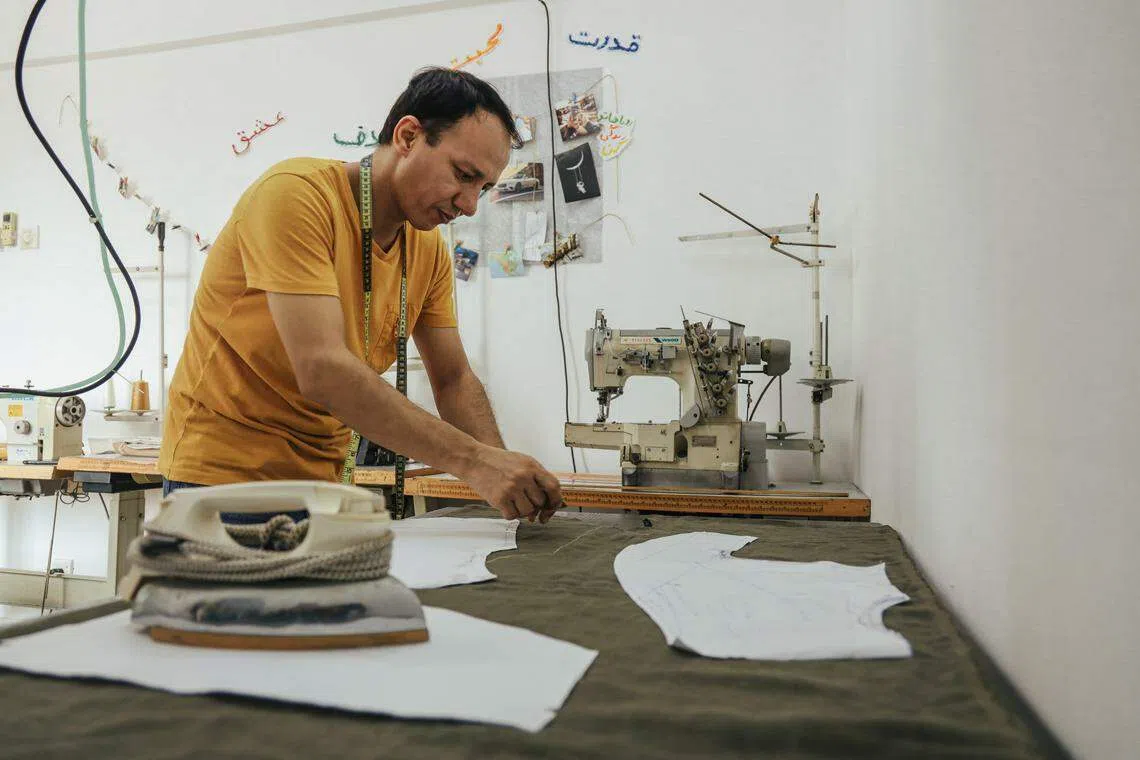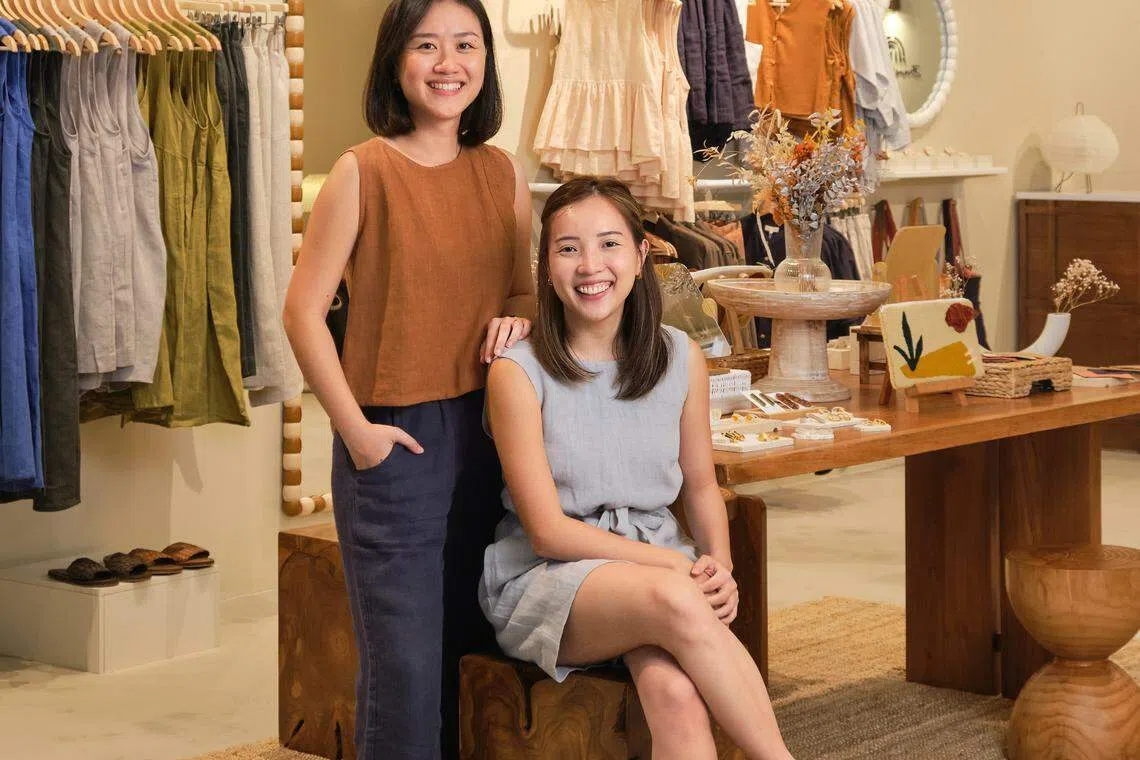Social enterprise Our Barehands helps unsung artisans market their work
It bridges the gap between craftspeople and the global market by assisting them with logistics
Lindsay Wong
A MAN and his wife – both Afghan refugees living in Malaysia – are each on sewing machines in their home, working on shirts. The tables in the room are strewn with measuring tape, linen and spools of thread.
This is the scene in many communities around the world that are partners with Our Barehands.
The Singapore-based social enterprise, founded in 2019, works with artisans in marginalised communities, such as Afghan refugees in Malaysia, to make handcrafted products. Its main business is in made-to-order clothing, which is sold through its online shop, but Barehands also sells accessories and furniture.
It now works with about 10 communities. Since its establishment, it has collaborated with more than 150 artisans from around the world, from Indonesia to Venezuela.
Co-founders Germaine Lye and Chanel Go say their business aims to create a sustainable livelihood for the artisans they work with.
Lye says: “The mid- or long-term goal is to help them see that they are dignified individuals. They have something to contribute to society, and this is where Barehands partners and walks with them, so that they can see that this is a sustainable livelihood.”
Navigate Asia in
a new global order
Get the insights delivered to your inbox.
Providing opportunities
The idea for Barehands came from Lye and Go’s 2018 trip to Myanmar, where they worked with a non-governmental organisation (NGO) to help coffee farmers grow good-quality coffee. They also trained local youths in customer service and barista skills.
Go says: “The heart behind that was to provide opportunities to people who don’t have them, and to create jobs that are dignified and meaningful.”
With this same philosophy, and networks built from work, school and church, Lye and Go set up Barehands, with a focus on the handicraft sector. The co-founders saw that there were artisans among marginalised communities who had good craft skills, but no means of showcasing their talent and earning an income from that.
Go explains: “They lack market know-how, and don’t know the designs in demand by the global market, and where to get good-quality materials. That’s where we felt we could fill in the gaps.”
Since many of the communities are rural, Barehands bridges the gap between the artisans and the global market by helping them with logistics.
Lye said: “Take, for example, the sewing community. They may not have access to fabric or good design or materials, although they are really good tailors. For that group, we supply the fabric and materials, and we partner with budding or local designers to create collections with them.”
Working with marginalised communities
During the Covid pandemic, an NGO introduced Lye and Go to an Afghan refugee in Malaysia, known only as JS. They were told he had been a tailor for many years, and was a “master pattern maker”, but could not land a job because of his refugee status. Lye and Go launched a sample collection with JS, which received good response from Barehands’ customers.

He shares: “I started working with Barehands during Covid, and was determined to do my best using my tailoring experience. I’m very pleased that I’ve contributed to the work at Barehands. This opportunity came at the right time, and has enabled me to support myself and my family. I am grateful.”
Go adds: “We saw how a business like (Barehands) could contribute to communities in this way, such that everyone benefits – forming an ecosystem in which value is created for each stakeholder.”
JS has since grown his team to five people, all from his refugee community. He is now a micro-entrepreneur, which had been a dream of his. After seven years with refugee status, he and his family have been granted permanent residency in Australia. *(see amendment note)
Lye says: “Being able to see their vision come into fruition is something that we are quite proud of.”
Working with marginalised communities has helped dispel misconceptions that people may have harboured about them, notes Go.
“(Refugees) are real people with good skills and dreams. As we showcase their work, we don’t want to sell the story that they are refugees who have no rights, so ‘please buy (their products) and support them’. Rather, these are very good craftsmen. You buy the product because you like the piece – and by the way, they are refugees.”
In addition to refugees, Barehands has also worked with the deaf community and single mothers in Singapore. It has trained them in crafts, enabling them to earn extra income via commissions. The projects they have worked on have included making around 200 handcrafted carriers for the launch of a sake, and painting clay accessories.
Going offline and future plans
Asked about how the artisans get on board, Lye replies: “We look at their skill level, their commitment level, and also whether they are like-minded – whether they share the same vision as us, that is, a vision of growth.”
Although Barehands still runs its online store, it opened its first permanent brick-and-mortar store in Funan mall this year.
Lye says: “We needed a platform to actually interact meaningfully with our customers.”

The majority of Barehands’ products are made to order. Customers specify the customisations they want, and wait seven to nine weeks for it to be made.
This approach curbs overproduction and reduces wastage. It also nudges customers into owning a piece that fits them well, and which they can keep for longer. Barehands also tries to use more environmentally-friendly materials, such as tencel fabric and wooden or bamboo buttons.
In the short term, the brand is collaborating with Bernadette Belle Ong, Miss Universe Singapore 2020, for a line of apparel made by the Afghan refugee tailoring community in Malaysia. It is slated for release at the end of this year.
In the long term, Lye and Go say they will focus on raising awareness about Barehands in Singapore, and then expand regionally or globally. With borders now reopened, they hope to make more frequent visits to artisans in order to “grow the community more holistically”.
Go adds: “Collaboration is at the heart of what Barehands does – bringing different hands with different skills and backgrounds together.”
*Amendment note: An earlier version of this article stated that JS and his family were granted Malaysian citizenship. A source has clarified that they have actually been granted permanent residency in Australia.
Decoding Asia newsletter: your guide to navigating Asia in a new global order. Sign up here to get Decoding Asia newsletter. Delivered to your inbox. Free.
Copyright SPH Media. All rights reserved.


